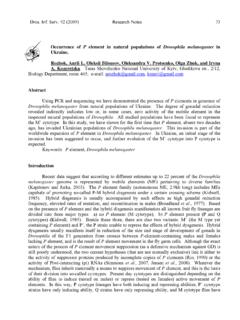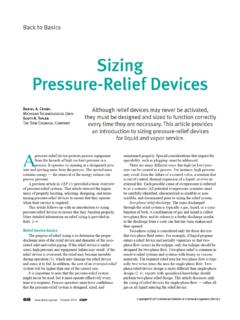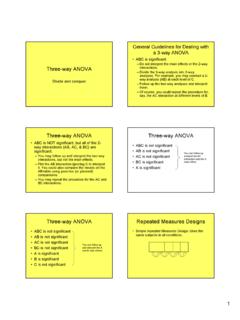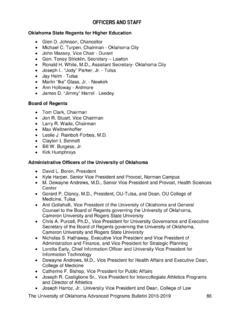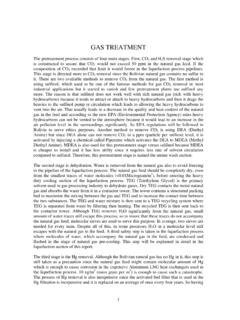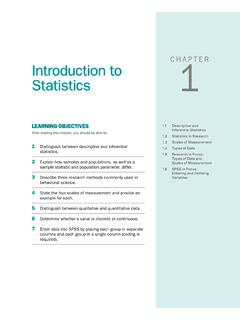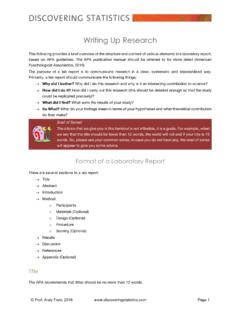Transcription of Previous Research Experience - University of Oklahoma
1 Previous Research Experience Although my Research career has just begun, I have accumulated a strong background in several Research fields and have developed a strong Research foundation that will help to ensure my future success as a scientist. Over the last two years, I have gained undergraduate and graduate Research Experience in the three main areas of mammalogy: field Research , laboratory techniques, and museum collections-based Research . In December 2003, I traveled to Colima, Mexico to work as part of a 26-member field crew that included students and professors from 7 universities and 2 Mexican universities. The 10-day trip investigated ecological interactions of rodents and small marsupials collected in Sherman traps, as well as documenting bat species using mist nets and carnivores using camera stations.
2 Voucher specimens were collected and tissues were collected for molecular investigations and for a study looking at Hanta Virus prevalence in small mammals. From this work, I obtained an intense introduction to field Research that resulted in my leaving my Previous educational path toward medicine and developing a deep commitment toward a career in mammalogy. I also began developing a network of colleagues in diverse field of mammalogy that continues to this day. During the summer of 2004, I conducted Research while supported by a National Science Foundation Research Experience for Undergraduates grant. Working independently under the direction of three professors (Drs. M. A. Mares, J. K. Braun, and R. A. Van Den Bussche) at two universities ( University of Oklahoma and Oklahoma State University ), I conducted original Research investigating the evolutionary histories (phylogenetic relationships and historical biogeography) of two genera of South American mice using DNA sequence data from the mitochondrial cytochrome-b gene.
3 The end results of this Research include three manuscripts and the description of four species new to science. From my REU-supported Research , I gained an appreciation for South American mammals and a sincere interest in their taxonomy, systematics, and natural history. As an undergraduate curatorial assistant at the Sam Noble Oklahoma Museum of Natural History, I worked with hundreds of specimens from the and Argentina and assisted the collections manager in all steps of the cataloguing and collections management processes. As an undergraduate Research assistant, I worked under the guidance of Drs. Mares and Braun actively assisting in the development of the literature base for their forthcoming book, The Mammals of Argentina, by investigating American, Argentine, Bolivian, Chilean, English, French, German, and Peruvian scientific literature dating back to the early 1800s.
4 I also gained valuable Experience in techniques used to evaluate the external and cranial morphology of museum specimens. Only six months into my graduate work at Oklahoma State University , I have gained additional Experience in field, lab, and museum Research . Working as one of three graduate Research assistants alongside Dr. Van Den Bussche, I am surveying fourteen sites in western Oklahoma for small mammals using traps and mist nets. Although purely descriptive , intensive survey work has been overlooked when it comes to Oklahoma mammals. To date, the Research has resulted in 19 new county records and range extensions for 14 taxa. The three-year project, along with surveys from other sites in Oklahoma , is critical to the rewriting of The Mammals of Oklahoma , by professors from Oklahoma State University and the University of Oklahoma .
5 While not in the field, I have generated preliminary data for my dissertation and have begun work on additional systematic investigations utilizing the cytochrome-b and cytochrome oxidase I genes and craniomorphometrics while mentoring two undergraduate students and one graduate student. In August 2005, I traveled to Argentina to the Museo Argentino de Ciencias Naturales in Buenos Aires as part of a three-member team inventorying and verifying species identifications of nearly 3500 rodent specimens. The trip marked my first, but definitely not last, trip to Argentina and added an important dimension to my study of the region's mammals. Working under the continuing tutelage of professors at Oklahoma State University and the University of Oklahoma , I can hope to utilize their combined expertise and gain much from my dissertation work.
6 Publications 2005 Wheeler, Q. D., H. L. Bart, Jr., R. S. Beaman, L. Bohs, B. S. Coyner, L. T. Deck, D. Frost, V. Funk, D. Lipscomb, M. A. Mares, L. M. Page, L. A. Prather, P. H. Raven, D. W. Stevenson, J. Stevenson, E. O. Wilson, and J. B. Woolley. Submitted. LINNE: Revolutionizing Taxonomy. Science. Presentations 2005 Coyner, B. S., J. K. Braun, M. A. Mares, R. A. Van Den Bussche, and R. M. Barquez. Phylogenetic and biogeographic relationships of gerbil mice Eligmodontia (Rodentia, Muridae) in South America. American Society of Mammalogists. Springfield, MO. American Society of Mammalogists' Undergraduate Research Award. 2005 Coyner, B. S., J. K. Braun, M. A. Mares, R. A. Van Den Bussche, and R. M. Barquez. Phylogenetic and biogeographic relationships of gerbil mice Eligmodontia (Rodentia, Muridae) in South America.
7 Southwestern Association of Mammalogists. Huntsville, TX. 2005 Coyner, B. S., J. K. Braun, M. A. Mares, R. A. Van Den Bussche, and R. M. Barquez. Phylogenetic relationships of the Akodon varius group (Rodentia, Muridae) in South America. Southwestern Association of Mammalogists. Huntsville, TX. 2005 Coyner, B. S., J. K. Braun, R. A. Van Den Bussche, and M. A. Mares. Phylogenetic and biogeographic relationships of gerbil mice Eligmodontia (Rodentia, Muridae) in South America. Texas Society of Mammalogists. Junction, TX. Rollin H. Baker Award for best overall undergraduate presentation. Manuscripts in Draft Braun, J. K. M. A. Mares, B. S. Coyner, R. A. Van Den Bussche, and R. M. Barquez. Phylogenetic and biogeographic relationships of gerbil mice Eligmodontia (Rodentia, Muridae).
8 In South America. Braun, J. K. M. A. Mares, B. S. Coyner, R. A. Van Den Bussche, and R. M. Barquez. Phylogenetic relationships of the Akodon varius group (Rodentia, Muridae) in South America. Braun, J. K. M. A. Mares, B. S. Coyner, R. A. Van Den Bussche, and R. M. Barquez. Three new species of Akodon from northwestern Argentina. Roehrs, Z. P., D. L. Martinez, B. S. Coyner, R. A. Van Den Bussche, M. J. Hamilton, D. M. Leslie, Jr., and D. J. Schmidly. New county records of mammals of western Oklahoma .
